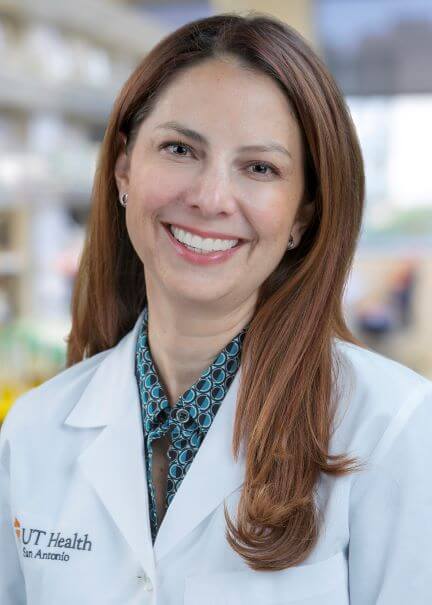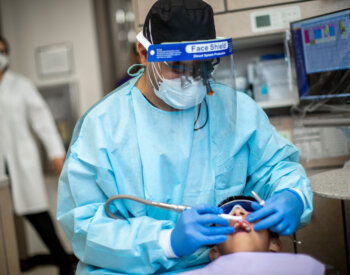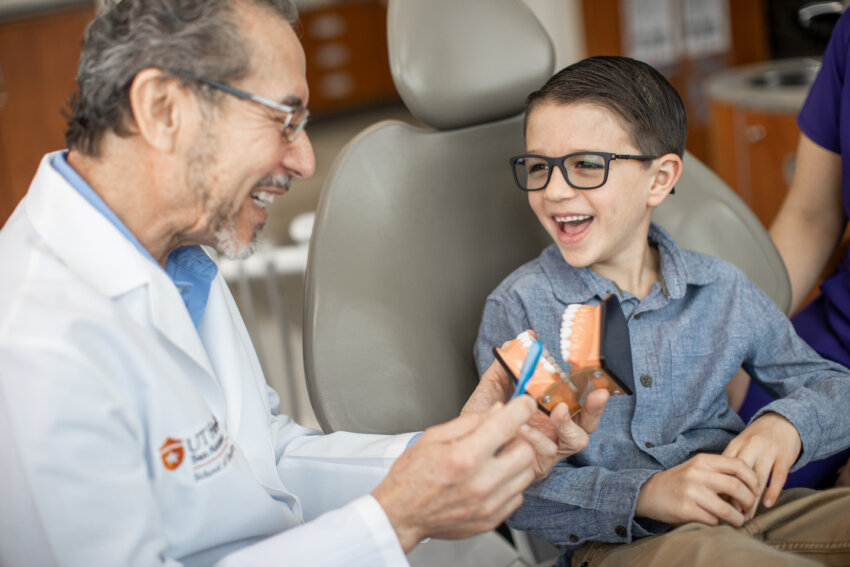Local efforts help highlight National Children’s Dental Health Month
Contact: Steven Lee, 210-450-3823, lees22@uthscsa.edu
Content contributed by Kristen Zapata
SAN ANTONIO and LAREDO, Texas, Feb. 8, 2023 – Two satellite community clinics of the UT Health San Antonio School of Dentistry are providing critical low-cost care, in particular addressing a high incidence of dental disease in Hispanic children.
Hispanic children ages 2 to 19 years have the highest prevalence of tooth decay at 57% compared with non-Hispanic white children who are affected at 40%, according to the National Center for Health Statistics. Lack of nutrition and access to care contribute to minority children and those living in lower socioeconomic conditions being at the most risk for cavities that turn into serious infections.
The Ricardo Salinas Pediatric Dental Clinic in San Antonio and the Laredo Health Department dental clinic offer patients high-quality, expert care at a manageable cost. Each clinic employs a bilingual staff, accepts patients with Medicaid, offers pediatric services on a sliding fee scale based on annual income for uninsured patients, and is managed by board-certified pediatric dental faculty.
February is National Children’s Dental Health Month of the American Dental Association, and the two community clinics of the UT Health San Antonio School of Dentistry are examples of efforts nationwide by thousands of dedicated professionals, health care providers and educators to promote the benefits of good oral health for children.
By some estimates, children are much more likely to miss school days due to dental-related problems than any other illness – a worry magnified in South Texas.

“Tooth decay is the most common chronic childhood disease in the U.S.,” said Maria Jose Cervantes Mendez, DDS, MS, director of the Advanced Education in Pediatric Dentistry Program at UT Health San Antonio. “One in five children are likely to have tooth decay by the time they go to kindergarten in our community, which rises to half by the time they finish elementary school.”
Cervantes Mendez’s program partners with the San Antonio Metropolitan Health District in the Ricardo Salinas Pediatric Dental Clinic, located on San Antonio’s west side at 630 S. General McMullen. The Laredo Health Department dental clinic, at 2600 Cedar Ave. in Laredo, is a partnership between the UT Health San Antonio School of Dentistry and the Laredo Health Department, offering services for both pediatric and adult patients.
Preventive treatment provided at the clinics can stave off emergency dental care, which account for billions of dollars of avoidable costs each year. Micaela Gibbs, DDS, MHA, chief dental officer of the UT Health San Antonio School of Dentistry, says that can cost families more than money, but children their physical and mental wellness, too.
“Dental cavities in children can have serious long-term effects on their overall health and quality of life,” she said. “The inability to eat can cause malnutrition and underdevelopment, and pain from dental disease impairs a child’s ability to sleep and learn. The stigma of poor oral health impacts self-esteem and socialization. All these collectively have long-term consequences that last into adulthood.”
Breaking it down
Cavities are an infectious disease caused by bacteria that produce acid when they feed on sugar in the mouth. The acid breaks down the tooth’s outer enamel layer, allowing bacteria to enter it and multiply. As cavities grow and bacteria continue to produce acid, the tooth continues to break down, often leading to infection, pain and swelling.
When this process happens in primary or “baby” teeth, it causes tooth loss that can lead to severe crowding, difficulty chewing, and even damage to the permanent teeth that have not yet erupted.
 While many families know what a healthy balanced diet includes, rising costs combined with a lack of nutritious foods readily available force the consumption of a carbohydrate-heavy diet, such as rice, potatoes, beans and bread. As carbohydrate particles become stuck between teeth after eating and drinking, they turn into sugar, the preferred food source for bacteria living in the mouth.
While many families know what a healthy balanced diet includes, rising costs combined with a lack of nutritious foods readily available force the consumption of a carbohydrate-heavy diet, such as rice, potatoes, beans and bread. As carbohydrate particles become stuck between teeth after eating and drinking, they turn into sugar, the preferred food source for bacteria living in the mouth.
And significant barriers exist for many families when attempting to receive dental care. The high cost of dental treatment, lack of insurance coverage, an insufficient number of Medicaid providers, language barriers and geographical challenges all provide obstacles for well-intentioned patients. For many cultures, a lack of experience with dentistry or not understanding its importance also contributes to hesitancy in seeking care.
It’s never too late
“We recommend that children visit a dentist by age one, so we can prevent dental disease from starting,” Cervantes Mendez said.
Still, she says, it’s never too late to schedule an appointment with a dentist, and at low cost. An exam will include an assessment of each tooth, the tissues of the mouth, the surrounding features of the head and neck, a preventive cleaning and fluoride treatment.
“We are incredibly proud of the exceptional care we offer at our two community clinics,” Gibbs said. “Patients will never experience lower quality care just because of reduced service cost.”
Many community partners and corporate sponsors would agree. The San Antonio Metropolitan Health District, the Children’s Shelter of San Antonio and the Texas Cavaliers have been long-term supporters of the Ricardo Salinas clinic, keeping patient costs low.
Delta Dental’s Community Care Foundation awarded $50,000 to support patient care at both clinics last year. The Laredo dental clinic is likewise only possible with the partnership of the City of Laredo’s Health Department.
“Appointments are available,” Cervantes Mendez said. “A dental issue should be the last thing on our children’s mind while at school and we can help ensure that.”
Families can make an appointment for the Ricardo Salinas Pediatric Dental Clinic by dialing (210) 450-8700 or the Laredo Health Department dental clinic at (956) 523-7500. Clinic location and maps can be found on UT Dentistry’s website.
The University of Texas Health Science Center at San Antonio (UT Health San Antonio), is one of the country’s leading health science universities and is designated as a Hispanic-Serving Institution by the U.S. Department of Education. With missions of teaching, research, patient care and community engagement, its schools of medicine, nursing, dentistry, health professions and graduate biomedical sciences have graduated more than 41,100 alumni who are leading change, advancing their fields and renewing hope for patients and their families throughout South Texas and the world. To learn about the many ways “We make lives better®,” visit UTHealthSA.org.
The UT Health San Antonio School of Dentistry offers 17 degrees and programs in both dentistry and dental hygiene, world-renown faculty educators, a diverse student population, state-of-the-art clinical facilities and a distinguished research enterprise. Departments include comprehensive dentistry, developmental dentistry, endodontics, periodontics, and oral and maxillofacial surgery. Scientists collaborate with clinicians and research teams worldwide, and work across multiple medical and dental disciplines to find new treatments, advancing knowledge of oral health, biomaterials, cancer, pain and more. To learn more, visit https://www.uthscsa.edu/academics/dental.
Stay connected with The University of Texas Health Science Center at San Antonio on Facebook, Twitter, LinkedIn, Instagram and YouTube.


